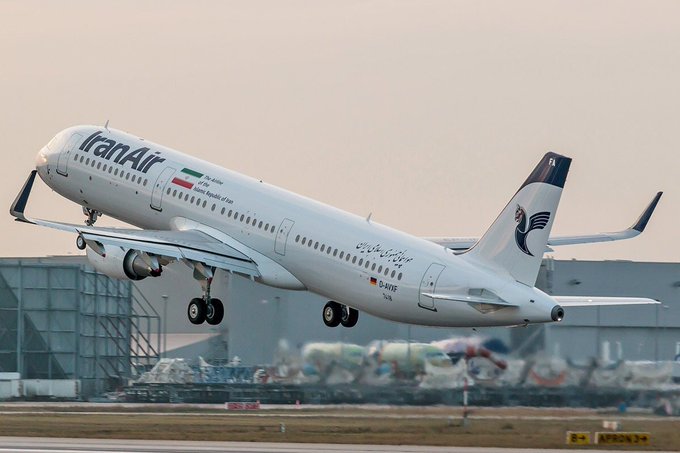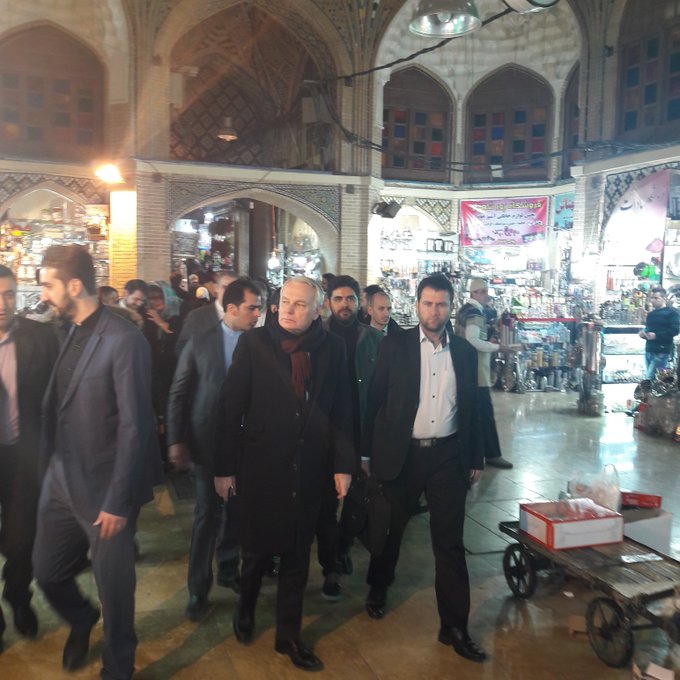Foreign Minister Ayraultís visit came a little more than a year after the nuclear deal, known as the Joint Comprehensive Plan of Action (JCPOA), went into its implementation phase and triggered the lifting of nuclear-related sanctions against the Islamic Republic. Among the six world powers that negotiated with Iran ó China, Britain, France, Germany, Russia and the United States ó France gained a reputation for being the most demanding. Despite this, Paris has been working hard to rebuild its diplomatic and economic ties with Tehran.
In July 2015 Ė on Bastille Day, as it happened Ė the world powers and Iran signed off on the terms of the JCPOA. With French reservations on Iranís nuclear activity seemingly met, then-Foreign Minister Laurent Fabius was soon bound for Tehran, striking up what the Iranian press labelled a ďcharm offensive.Ē ďBoth countries,Ē he wrote in an Iranian newspaper, ďcan further their economic cooperation as new perspectives open up.Ē A few months later, and just days after sanctions were formally lifted, Iranian President Hassan Rouhani travelled to Rome and Paris, signing a series of blockbuster deals signalling that the Islamic Republic was coming in from the political and financial cold.
French firms, many of whom have long histories of operating in Iran, have been quick to re-engage Tehran. Bloomberg estimated that the French leg of Rouhaniís journey alone racked up more than 30 billion dollarsí worth of business. As European oil imports from Iran rise to their highest levels in half a decade, France has been Tehranís most significant customer in the bloc, and French energy giant Total has taken the lead on a major gas project in South Pars. Automakers Renault and PSA Peugeot Citroen have signed hundreds of millions of dollars worth of deals with Iranian partners, with an array of other projects Ė from infrastructure to hotels to cosmetics Ė† also in the works.
The multi-billion dollar deal inked in Paris last year with Airbus is perhaps the most high-profile agreement. The January 2017 delivery of an A321 jet was the first of dozens of aircraft Tehran ordered from the Toulouse-based aviation giant. It was welcomed at Mehrabad Airport with a ceremony that would not have been out of place for a visiting dignitary while local press hailed it as ďmore than just a plane.Ē It was the first brand new aircraft that Iran Air had received in 23 years.
View image on Twitter

Follow
 Iran Air @IranAir_IRI
Iran Air @IranAir_IRIIsn't that a beautiful #airplane in a beautiful livery? #IranAir#Homa#A321
11:07 PM - 11 Jan 2017
The result of these agreements has been a 200 percent rise in Franco-Iranian business within a year. According to the French Foreign Ministry, Ayrault was travelling with representatives of five dozen French companies, and among his engagements was presiding over the inaugural session of the French-Iranian Business Forum. While the trip was a fairly modest affair in terms of deliverables Ė reports from Tehran noted a handful of agreements, including one for ďsturgeon piscicultureĒ Ė it affirms the commercial gains of a particularly active year for French and wider European business in the Islamic Republic. Iran also received a French pledge to raise the number of visas for Iranians from 40,000 to 80,000.
View image on Twitter

Follow
 France en Iran ?@FranceenIran
France en Iran ?@FranceenIranRespiration pour @jeanmarcayrault aprŤs de nombreux entretiens politiques : le bazar de Tťhťran. Merci aux commerÁants de leur accueil !
10:43 AM - 1 Feb 2017
Translation:†A breather for @jeanmarcayrault after a number of political discussions: the Tehran Bazaar. Thanks to the merchants for their hospitality!
Yet for all the deals being made, the budding relationship has run into some obstacles, particularly the reluctance of major French and other European banks to handle Iran-related business.† Tehran has blamed Washington for the hesitation, while others highlight the uncertain scope of remaining sanctions as well as the inherent internal risks in the Iranian financial system. During his recent visit, Ayrault acknowledged the problems, while promising that ďthere has been progress and there will be more progress.Ē
Furthermore, more challenges may lie ahead, as Tehran as well as Washingtonís European allies wait to see how the new Trump Administration handles the nuclear deal as well as its wider policy towards the Islamic Republic. During the presidential campaign, Trump asserted that his ďnumber-one priority is to dismantle the disastrous deal with Iran.Ē This has not yet come to pass, but the U.S. response to Iranís latest ballistic missile test may indicate the new administrationís hardening line on Iran. On February 1, National Security Advisor Mike Flynn condemned ďIranís destabilizing behaviour across the Middle EastĒ and officially ďput Iran on notice.Ē Two days later, the U.S. Treasury announced new sanctions on 25 individuals and entities for providing support to Iranís ballistic missile program and its Islamic Revolutionary Guard Corpsí Qods Force.
The French have taken a negative view of Iranís recent ballistic missile tests, and other aspects of Iranian regional policy have also been ongoing points of contention. On Syria, for example, Ayrault has suggested that Tehranís involvement on the side of the Assad government, including military and financial support, reflects a ďstrategy that leads to a dead-end.Ē
Paris, like Washington, certainly sees some elements of Iranian activity as problematic, but it regards the JCPOA as a springboard from which to expand dialogue rather than a problem in its own right. ďThis deal gives us guarantees. The absence of an accord would be very serious,Ē argued President Francois Hollande after Trumpís election win. In Tehran, Ayrault declared that ďIím coming as the defender of the accord,Ē while adding that ďwe harbour real concerns about the U.S. administrationís attitude towards this agreement.Ē
In this regard, French officials are in concert with other European officials who have indicated to the Trump Administration that the nuclear agreement is one area where theyíd like to see continuity rather than change. In January, Federica Mogherini, the European Unionís High Representative for Foreign Affairs, referred to it as ďproof that diplomacy works and delivers,Ē going on to assert that the bloc ďwill continue to work for the respect and implementation of this extremely important deal, most of all for our security.Ē
For President Rouhani, Ayraultís visit was one of reassurance, that the post-JCPOA Franco-Iranian rapprochement is holding steady. For Washington, the takeaway may be that for its perceived flaws, the nuclear deal retains the support of its European allies.










